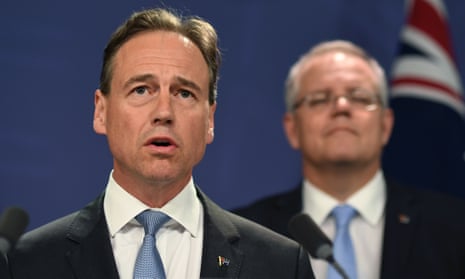The health minister, Greg Hunt, and the Australian Digital Health Agency have refused to give an update on how many Australians have opted out of the My Health Record system.
All Australians who have not opted out by 15 November will have a My Health Record automatically created in their name, sparking fears from privacy experts that the public has not had sufficient time to opt out as demand increases before the looming deadline.
Although the government has bipartisan support for a range of new safeguards first recommended by Labor, the opposition is considering a plan to move an amendment to extend the opt-out period when legislation comes before the Senate next week.
Senator Stirling Griff told Guardian Australia that Centre Alliance would support a legislative push to extend the opt-out period, and the Greens have already called for an extended opt-out in a Senate inquiry report on My Health Record.
On 24 October the ADHA told Senate estimates that 1,147,000 Australians had opted out of My Health Record, a figure that was accurate at 19 October.
Reports of lengthy telephone wait times and a systems crash on the hotline suggest that a high volume of people are opting out in the final weeks before 15 November. Both Hunt and the ADHA refused to provide an updated figure.
“The ADHA will not be providing any statistics on opt-out until after the opt-out period has closed on 15 November, and following the reconciliation period for the processing of paper forms arriving by mail,” an ADHA spokesman said.
A spokeswoman for Hunt said the figure of 1.147m opt-outs was about 4% of Australians when the government had “anticipated an opt-out rate of 10%”. She said more than 300,000 Australians had chosen to opt in to the system since 16 July.
The Australian Privacy Foundation health committee chair, Bernard Robertson-Dunn, told Guardian Australia it supported calls to extend the opt-out period because “we don’t believe the Australian people have been given enough information”.
He said a “proper public information campaign” on My Health Record would include not just the benefits of the system but the “potential costs and risks”, which he said the government had provided “no information whatsoever” about.
Robertson-Dunn said wait times for the opt-out phone line had increased, and it was now “not uncommon” for callers to report wait times of 30 to 45 minutes.
He said wait times and a recent systems crash “indicate strongly that interest in opting out is strongly correlated with the amount of attention on the My Health Record system and the looming deadline”.
“The question is: in a week’s time, how many people may never have heard of the My Health Record system? Or how many people simply didn’t get around to opting-out but would want to?”
Hunt’s spokeswoman said that “people can opt-out at any time”. “Those that wish to delete their record after the 15 November opt-out date can do so at any time throughout their lives and their record will be deleted forever.”
In July – after insisting warrantless access was not possible – Hunt was forced to back down and announce changes so no record can be released to police or government agencies without a court order.
On Thursday the government announced more changes to My Health Record, including increasing penalties for improper use of the record system; preventing employer and insurer access; and strengthening provisions to safeguard against domestic violence.
Labor’s health spokeswoman, Catherine King, said the government was “finally moving to clean up their My Health Record mess – by adopting Labor’s proposed changes – but they still need to act and extend the opt-out period.
“Because the government’s existing legislation will need to be amended, it will need to be sent back to the lower house for approval – and the lower house doesn’t sit again until 10 days after the opt-out period ends.”
